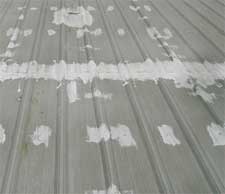Considering repainting steel panels?
Steel roofing and siding is designed to provide decades of maintenance free use. There are cases where clients feel the need to change colors, which can be done, following the process outlined below for repainting steel panels.
Any building panel surface to be repainted must be prepared and treated properly to insure continued performance of the coating system. The following four problem areas must be addressed before the repainting process can begin.
What do I need to do before repainting steel?
 Dirt, chalk and loose mildew can be removed by the use of common soap solutions. Heavier dirt accumulations may necessitate the use of a dilute solution of trisodium phosphate, and excessive mildew may be treated with a dilute solution of common bleach. (NOTE: Never blend cleansers and bleach.) Always rinse the surface thoroughly to remove any of the agents used in the cleaning procedure. Recommended detergents are Soilax® and/or Tide®, at a concentration of one cup for five gallons of warm water.
Dirt, chalk and loose mildew can be removed by the use of common soap solutions. Heavier dirt accumulations may necessitate the use of a dilute solution of trisodium phosphate, and excessive mildew may be treated with a dilute solution of common bleach. (NOTE: Never blend cleansers and bleach.) Always rinse the surface thoroughly to remove any of the agents used in the cleaning procedure. Recommended detergents are Soilax® and/or Tide®, at a concentration of one cup for five gallons of warm water.
There may be a layer of factory-applied wax on the surface of the steel. This material is used to protect the steel during transit, and failure to remove this material will result in poor intercoat adhesion, and – eventually – peeling or flaking. To remove this material, it will be necessary to wipe the surface with a rag saturated with Xylene (Xylol). This industrial solvent will facilitate the removal of the wax and assure maximum adhesion between the substrate and the repainted material.
What happens if I don’t prepare the steel panels right?
In the Pacific Northwest, the Skipper’s® chain of seafood restaurants decided to change the color of the steel on their buildings from orange to blue. Not all of the steel was prepared properly and in some cases, the new paint peeled off in sheets!
Minor scratches, which have not left the metal substrate exposed, can be lightly sanded or buffed to create a smoother surface. Care must be taken, however, not to expose the substrate. Once this exposed condition exists, the likelihood for rusting is greatly increased. Should the metal substrate be observed during this operation, see the following paragraph.
Is exposed steel a problem?
Exposed steel must be treated to prevent rust from forming. To do so, sand the general area lightly and use a high-quality primer to protect the exposed steel from corrosion. Allow sufficient time for the primer to dry before applying the topcoat. If either red or white rust is evident scrape or brush away as much rust as possible and then sand lightly, removing all rust before proceeding. Where large areas of rusting or surface imperfections are evident, the relative economy of power brushing or sand-blasting should be considered. Sandblasting with 16-35 mesh sand will provide a commercially clean and well-abraded surface for painting. If such a procedure is undertaken, make certain that all dust from the abrading process is removed before priming the substrate.
How is adhesion obtained?
The surface to be re-coated must be abraded enough to guarantee adequate adhesion. If the baked enamel finish is too smooth, the repaint material will not adhere to it, and it is advisable to test a representative area of the building to evaluate adhesion. If poor adhesion is observed, the surface must be “roughed-up” by sanding (#400 mesh recommended) or power washing. It is imperative the enamel finish itself not be removed during this process.
After the building has been properly prepared, it must be immediately coated with a direct to metal epoxy primer. After the primer has fully cured, apply a compatible topcoat. The primer and compatible topcoat may be purchased from any major paint retailer. Follow the manufacturer’s instructions for application technique and cure time.
Do not start a fire!
THESE FIELD-APPLIED COATINGS AND SOLVENTS ARE FLAMMABLE MATERIALS. Keep away from heat and open flames. Use normal precautions when handling. DO NOT USE ON WET SURFACES. For best results, do not apply when temperature is below 55°F or when temperature is abnormally high.
Repaint or re-steel?
My wife’s story? She tells me she once scrubbed an entire two story house which had steel siding, prior to repainting the steel panels. Other than the labor to scrub the chalk and other dust/grime off, she said the process was “worth it”. She got the new color she wanted and repainted the house with good results. The paint has had no signs of peeling or flaking off, some 18 years later.
Personally, when I have wanted to change the color of a steel covered building, I’ve found the best result, was to replace the steel with new steel in the color I desired. While not an inexpensive proposition, the end result has always been worth it to me.






